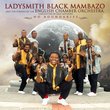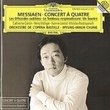| All Artists: Igor Stravinsky, Benjamin Zander, Boston Philharmonic Orchestra, Rex Lawson Title: Stravinsky: The Rite of Spring (Orch & PIANO ROLL version) (IMP) Members Wishing: 1 Total Copies: 0 Label: IMP Original Release Date: 1/1/2000 Re-Release Date: 3/23/1999 Album Type: Import Genre: Classical Styles: Ballets & Dances, Ballets, Historical Periods, Modern, 20th, & 21st Century, Symphonies Number of Discs: 1 SwapaCD Credits: 1 UPCs: 723723511928, 5030366009923 |
Search - Igor Stravinsky, Benjamin Zander, Boston Philharmonic Orchestra :: Stravinsky: The Rite of Spring (Orch & PIANO ROLL version) (IMP)
 | Igor Stravinsky, Benjamin Zander, Boston Philharmonic Orchestra Stravinsky: The Rite of Spring (Orch & PIANO ROLL version) (IMP) Genre: Classical
|
CD DetailsSimilarly Requested CDs
|
CD ReviewsMatch with the Piano Version is Amazing! Andrew M. Klein | Washington, DC USA | 01/16/2000 (5 out of 5 stars) "Zander, of course, does an amazing job with this incredible music. His ability to keep the parts separate, clear and biting in spite of the drive that he imparts to his orchestra (as in Zander's other spectacular work with Beethoven and Mahler) make this a performance to return to again and again. What was truly astounding for me, however, was a first hearing of this music as it was written for the piano. If you've ever been in doubt that the piano is properly characterized as a percussion instrument, this will clear that up! Incredible playing. Hard to imagine how it's done. Importantly, the piano version, to me anyway, sheds a great deal of light on what the composer was after in the orchestral version. Another Zander lesson for which I am grateful." A good Le Sacre and a fascinating pianolo roll Santa Fe Listener | Santa Fe, NM USA | 02/21/2006 (4 out of 5 stars) "This 1990 CD is striking, to begin with, because a semi-pro orchestra sounds so convicning in The Rite of Spring, once considered almsot beyond the reach of professional orchestras. But technique advances to keep up with demands, and if one weren't told that this orchestra is a mixture of professinals, semi-pros, conservatory students, and amateurs, it would be impossible to guess. Zander certainly doesn't ease off in his demands--there's plenty of volatility and barbarism in his reading. Carlton Classics provides excellent, detailed sound, a bit too close given the restricted size of Jordan Hall in Boston, I suspect. I don't find any revelatory moments in Zander's interpretation, but as always he is very musical and alert.
The curiosity here is a pianola (player piano) version of Le Sacre directly supervised by the composer around 1920. Stravinsky, curiously enough, was so taken with piano rolls that he rented an apartment in the building where they were being made in Paris. He liked the fact that a human perfomrer, with all his quirks and personal ideas, could be excluded. And the piano roll wasn't restricted to the number of notes that ten fingers can manage. Still, we can't help but hear a person playing, even if it is a machine. What does this soloist sound like? Well, he doesn't sound entirely mechanical, which is rather amazing, but he doesn't have a great pianist's touch, either, not by a long shot. He's an exciting robot at the keyboard. With all the color and most of the perosnality drained from the score, what we have is a transcript of rhythms, generally at veyr high speed, which is what Stravinsky heard in his head but which no orchestra could possibly achieve. It's awfully percussive--as are the various arrangements for two and four painos that have appeared over the years--and as interesting as the experience might be, I prefer the overdubbed recording made by Fazil Say (on Nonesuch), who recorded himself over and over again, then sandwiched the layers to give us a superhuman performance of Le Sacre by one artist." |

 Track Listings (28) - Disc #1
Track Listings (28) - Disc #1


